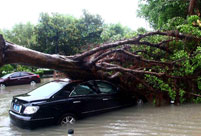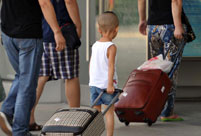BEREAVED PARENTS
For a decade, Huang Xuming has prepared feasts, cleaned rooms and chatted with her daughter Huanhuan. Huang, 59, cannot accept the fact that her only child is dead.
Huanhuan was killed by a truck 10 years ago. She was 25 and had just received her master's degree from a university in Guangxi. Huang and her husband have never recovered from the blow. They often have hallucinations and believe their daughter is on her way home. When they are sober-minded they can never keep back their tears. The couple both retired early and their pension is only 1,500 yuan.
"We don't fear death, but we are afraid of falling ill with no one around to help," said Huang.
The exact number of parents like Huang is unclear, though the Ministry of Health said at least 1 million Chinese families had lost their only children by 2010, with the figure climbing by 76,000 a year.Physician-turned-sociologist Yi Fuxian is even more pessimistic, estimating that as many as 10 million Chinese families have lost their only offspring.
Yi's calculation is based on national census data: 218 million children were born as their family's only child between 1975 and 2010. Out of every 10,000 births, 360 died before the age of 10 and 463 died before 25.
"Statistically, that means 10.09 million out of China's 218 million members of the one-child generation die before reaching 25," Yi said.
The one-child policy which took effect in the late 1970s, has cut China's population by about 400 million, but left many elderly and middle-aged couples with broken hearts.
"Most of these bereaved parents are aged between 40 and 60, often too old to have another child," said Prof. Lu Li with Guangxi University of Medical Sciences. "It's difficult for them to walk out of the shadow and they are susceptible to depression as well as cardiovascular and cerebrovascular diseases."
The increasing number of bereaved parents is even more of a challenge to China's social security service, said Prof. Zhou Xiaozheng.
"Most of these parents belong to low-income groups and suffer mentally, physically and financially, particularly in the underdeveloped western provinces," he said.
In addition to their pensions, families who have lost their only children receive a monthly subsidy from the local government. The amount, however, averages 2,000 yuan in the rich eastern provinces of Jiangsu and Zhejiang, but is less than 1,000 yuan in the underdeveloped Guangxi region, and Sichuan, Yunnan and Shaanxi provinces.
Tian Wei became alcoholic after his only son died in the Sichuan earthquake in May 2008. He was 19.
Many deprived couples had babies again thanks to a government-funded, post-quake pregnancy program, but Tian and his wife were neither young nor healthy enough to have another child.
"In the countryside, we believe it's a loss of face to have no offspring," said Tian, 52. "I dread the future."


 2013 Colour Me Rad 5K run held in Canada
2013 Colour Me Rad 5K run held in Canada China's destroyer Qingdao sails out of Sydney Harbor
China's destroyer Qingdao sails out of Sydney Harbor Chinese tycoon aims to restore London's Crystal Palace
Chinese tycoon aims to restore London's Crystal Palace Typhoon Fitow affects 4.56 million people in east China
Typhoon Fitow affects 4.56 million people in east China Game for the brave: 'Spiders' in Yandang Mountains
Game for the brave: 'Spiders' in Yandang Mountains Travel peak witnessed on last day of National Day holiday
Travel peak witnessed on last day of National Day holiday  New couples take wedding photos during holiday
New couples take wedding photos during holiday Serena Williams stumbles through to quarterfinals
Serena Williams stumbles through to quarterfinals Thailand Mobile Expo 2013 kicks off
Thailand Mobile Expo 2013 kicks off Photo collection of Chinese Navy
Photo collection of Chinese Navy Dense haze envelops N China
Dense haze envelops N China Twins Culture Festival kicks off in Beijing
Twins Culture Festival kicks off in Beijing UNESCO world heritage site: Montale Tower
UNESCO world heritage site: Montale Tower Israeli drone crashes into Mediterranean, fragments recovered
Israeli drone crashes into Mediterranean, fragments recovered Serena Williams wins second China Open title
Serena Williams wins second China Open titleDay|Week|Month